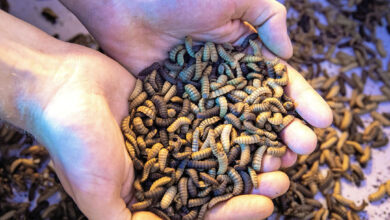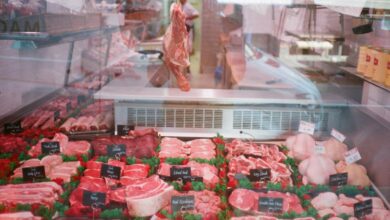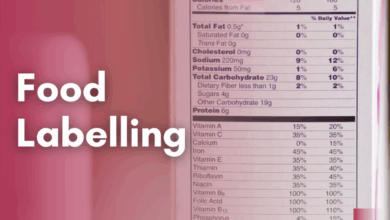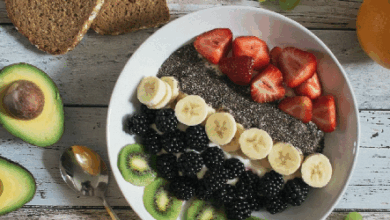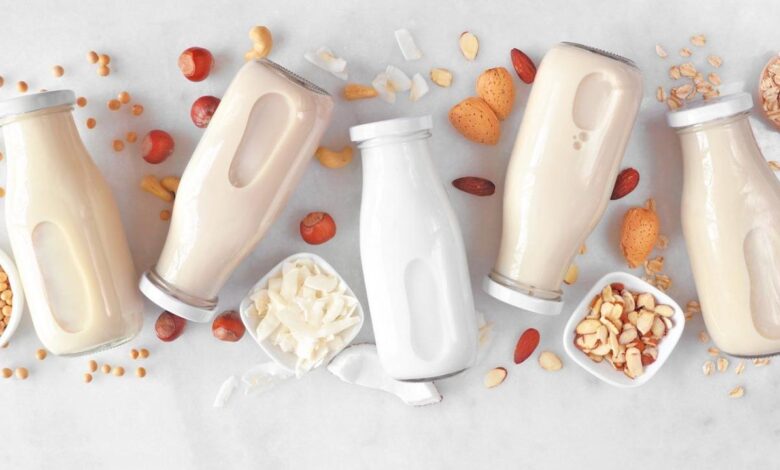
Why vegans have a higher risk of bone fractures? This exploration delves into the potential nutritional gaps in vegan diets that could lead to weakened bones and an increased susceptibility to fractures. We’ll examine key nutrients like calcium, vitamin D, vitamin K, and protein, and how their availability in plant-based foods differs from animal-based sources. Understanding these factors is crucial for vegans to maintain optimal bone health.
The discussion will cover the importance of sufficient protein intake, the role of vitamin D in calcium absorption, and the vital function of vitamin K in bone metabolism. We’ll also explore potential strategies for vegans to ensure adequate intake of these crucial nutrients, considering factors like bioavailability and food choices. Further, this analysis will touch upon lifestyle factors, such as exercise and genetics, that can interact with nutritional choices to influence fracture risk.
Nutritional Deficiencies in Vegan Diets
A plant-based diet offers numerous health benefits, but it can also pose challenges in meeting certain nutritional needs, particularly those crucial for bone health. Understanding these potential deficiencies and how to mitigate them is essential for vegans to maintain optimal skeletal well-being.A vegan diet, while rich in many vital nutrients, can be deficient in specific components essential for strong bones.
This is because some nutrients are more readily absorbed from animal-based foods compared to plant-based sources. This difference in bioavailability can impact overall nutrient intake and contribute to a higher risk of bone fractures.
Key Nutrients for Bone Health Often Missing in Vegan Diets
Several key nutrients play a critical role in bone health. A vegan diet may lack adequate amounts of these nutrients, potentially increasing the risk of bone fractures.
Calcium
Calcium is the primary mineral component of bones and teeth. Its crucial role in maintaining bone density cannot be overstated. Insufficient calcium intake can lead to weakened bones, making them more susceptible to fractures. While plant-based sources contain calcium, its absorption rate is often lower compared to calcium from animal products.
Vitamin D
Vitamin D is essential for calcium absorption and utilization. It facilitates the movement of calcium from the digestive tract into the bloodstream, where it can be transported to bones. Many vegans may have lower vitamin D levels due to limited exposure to sunlight (a primary source of vitamin D) and reduced intake from fortified foods. This deficiency can lead to impaired calcium absorption and contribute to weakened bones.
One reason vegans might have a higher risk of bone fractures is their lower calcium intake. This often means they need to be extra careful about their diet. Luckily, there are excellent resources to help with understanding various health concerns, such as those found in the best fetal alcohol spectrum disorders blogs, best fetal alcohol spectrum disorders blogs.
Ultimately, a balanced diet, including calcium-rich foods or supplements, is key to preventing fractures, regardless of dietary choices.
Vitamin K
Vitamin K plays a crucial role in bone metabolism by aiding in the synthesis of proteins essential for bone mineralization. Its deficiency can hinder the process of calcium deposition in bones, further increasing fracture risk. Plant-based foods contain vitamin K, but its absorption and utilization might not be as efficient as in animal-based foods.
Protein
Adequate protein intake is vital for maintaining bone mass and strength. Protein is involved in bone structure and repair. A vegan diet, while potentially rich in protein from plant sources, might not always provide sufficient quantities of high-quality protein necessary for optimal bone health.
Bioavailability Differences in Plant-Based and Animal-Based Foods
The bioavailability of nutrients refers to how effectively the body absorbs and utilizes a nutrient from a food source. Plant-based foods often contain phytates and oxalates, which can bind to minerals like calcium and hinder their absorption. Animal-based foods, on the other hand, often contain nutrients in forms that are more easily absorbed.
Nutrient Content Comparison
| Nutrient | Vegan Food Source | Non-Vegan Food Source | Calcium (mg) | Vitamin D (mcg) | Vitamin K (mcg) | Protein (g) |
|---|---|---|---|---|---|---|
| Milk (1 cup) | Cow’s milk | Soy milk | 300 | 2.5 | 10 | 8 |
| Yogurt (1 cup) | Soy yogurt | Plain yogurt | 200 | 1.5 | 15 | 12 |
| Cheese (1 oz) | Vegan cheese | Cheddar cheese | 150 | 0.5 | 10 | 7 |
| Spinach (1 cup) | Spinach | Spinach | 100 | 0.2 | 25 | 3 |
| Tofu (1 cup) | Tofu | Tofu | 50 | 0.1 | 10 | 8 |
| Almonds (1 oz) | Almonds | Almonds | 75 | 0.5 | 10 | 6 |
| Edamame (1 cup) | Edamame | Edamame | 20 | 0.1 | 5 | 10 |
Absorption Rates of Bone-Related Nutrients
The absorption rate of calcium and other bone-related nutrients varies significantly between plant-based and animal-based sources. Plant-based sources often have lower absorption rates due to the presence of compounds that hinder the absorption of these minerals.
Impact of Protein Intake on Bone Health
Protein is crucial for building and maintaining healthy bones. It’s a fundamental component of bone matrix, providing the structural framework that supports bone density and strength. Adequate protein intake is essential for the production of collagen, a vital protein that gives bones their flexibility and resilience. This, in turn, significantly impacts the overall health and integrity of the skeletal system.Insufficient protein intake, a concern for many dietary choices, can negatively impact bone health, particularly in vulnerable populations like vegans.
Vegans often face a higher risk of bone fractures due to lower calcium intake, a crucial mineral for bone health. While this isn’t directly related to conditions like emphysema, which is a non-communicable lung disease, it’s worth exploring how different dietary choices affect overall health. For a deeper dive into the communicability of emphysema, check out this helpful resource on is emphysema communicable or noncommunicable.
Ultimately, a balanced diet, including adequate calcium and vitamin D, is key for maintaining strong bones, regardless of dietary preferences.
This reduced protein availability hinders the body’s ability to synthesize and maintain the crucial proteins needed for bone formation and repair. The impact on bone density and strength can lead to increased fracture risk, especially over time. Therefore, understanding and addressing protein needs is critical for vegans to maintain optimal bone health.
Importance of Protein in Bone Formation
Proteins like collagen are essential structural components of bone tissue. Collagen provides the framework for bone mineral deposition, which is the process of incorporating calcium and other minerals into the bone matrix. Without sufficient protein, the body struggles to build and maintain this framework, leading to weaker bones. Adequate protein intake also supports the maintenance of bone cells (osteoblasts and osteoclasts), which are responsible for bone formation and resorption, respectively.
This dynamic balance is critical for healthy bone remodeling.
How Inadequate Protein Intake Affects Bone Density and Strength in Vegans
Insufficient protein intake in vegans can directly impact bone density and strength. The reduced availability of amino acids, the building blocks of proteins, compromises the body’s ability to produce and maintain the necessary proteins for bone health. This can lead to reduced bone mass, making bones more susceptible to fractures, particularly from everyday activities. A lack of protein can also affect the absorption and utilization of calcium, another crucial mineral for bone health.
High-Protein Plant-Based Foods and Their Protein Content
Many plant-based foods are excellent sources of protein. Incorporating a variety of these foods into a vegan diet can help ensure sufficient protein intake.
- Soy products, like tofu and tempeh, are excellent sources of complete protein, meaning they contain all nine essential amino acids. A typical serving of tofu can provide 8-10 grams of protein.
- Legumes, including beans, lentils, and chickpeas, are rich in protein and fiber. A cup of cooked lentils can contain approximately 18 grams of protein.
- Nuts and seeds, such as almonds, chia seeds, and pumpkin seeds, are also excellent sources of protein and healthy fats. A handful of almonds typically contains around 6 grams of protein.
- Quinoa is a complete protein source, providing a substantial amount of protein per serving, comparable to many animal products. A cup of cooked quinoa provides around 8 grams of protein.
Nutritional Information of Vegan Protein Sources
The table below illustrates the protein content and other key nutrients in several vegan protein sources. This information can help vegans tailor their diets to meet their specific protein and nutritional needs.
| Food | Protein (g per serving) | Calcium (mg per serving) | Iron (mg per serving) |
|---|---|---|---|
| Tofu (1 cup, firm) | 8-10 | 100-200 | 1-2 |
| Lentils (1 cup, cooked) | 18 | 50-100 | 3-4 |
| Almonds (1/4 cup) | 6 | 20-30 | 1-2 |
| Quinoa (1 cup, cooked) | 8 | 10-20 | 2-3 |
| Chia Seeds (1 tbsp) | 4 | 10-20 | 1-2 |
Strategies to Ensure Adequate Protein Intake for Vegans
To ensure adequate protein intake, vegans should:
- Consume a variety of plant-based protein sources daily. This ensures a wider range of amino acids and helps meet individual needs.
- Combine complementary proteins in meals. For example, combining beans with rice or lentils with whole grains can enhance protein quality.
- Pay attention to portion sizes. Even high-protein plant-based foods should be consumed in appropriate quantities to meet daily protein needs.
- Consider protein supplements, if necessary, to bridge any gaps in intake. These supplements can provide concentrated protein and ensure needs are met, particularly for athletes or individuals with higher protein requirements.
Vitamin D Deficiency in Veganism
A plant-based diet offers numerous health benefits, but it can sometimes pose challenges in meeting specific nutritional needs. One crucial nutrient often overlooked in vegan diets is vitamin D, a vital component for bone health and overall well-being. Understanding its role, how sun exposure affects levels, and practical strategies for vegans to ensure adequate intake are essential for maintaining optimal health.Vitamin D plays a critical role in calcium absorption, a process essential for maintaining strong and healthy bones.
Calcium and vitamin D work synergistically, with vitamin D enhancing the absorption of calcium from the gut into the bloodstream. This combined action supports bone mineralization, strengthening bone density and reducing the risk of fractures. Adequate vitamin D levels are also linked to improved immune function and reduced risk of certain chronic diseases.
The Role of Sun Exposure
Sun exposure is a primary source of vitamin D for both vegans and non-vegans. Sunlight triggers the body’s production of vitamin D3, a biologically active form of the vitamin. The amount of sun exposure needed varies depending on factors like skin pigmentation, time of day, and geographic location. Individuals with darker skin require more sun exposure to produce the same amount of vitamin D compared to those with lighter skin.
Cloud cover and air pollution can also reduce the amount of UVB radiation reaching the skin, affecting vitamin D production. The time of day also plays a significant role, as the intensity of UVB rays is highest around midday.
Vegan Food Sources of Vitamin D
Unfortunately, naturally occurring vitamin D in plant-based foods is extremely limited. While some foods like mushrooms can contain trace amounts of vitamin D2, this form is not as readily utilized by the body as vitamin D3. In practice, relying solely on plant-based sources to obtain sufficient vitamin D is not a viable strategy for most vegans.
Implications of Vitamin D Deficiency on Bone Health
Vitamin D deficiency can lead to various bone health problems, including rickets in children and osteomalacia in adults. Rickets is characterized by soft, weak bones, resulting in skeletal deformities. Osteomalacia, on the other hand, leads to bone pain, muscle weakness, and an increased risk of fractures. A deficiency can significantly compromise bone density and increase the susceptibility to fractures, impacting mobility and overall quality of life.
Strategies for Vegans to Meet Vitamin D Needs
Given the limited availability of vitamin D in plant-based foods, vegans need to actively address their vitamin D needs through supplementation and careful sun exposure.
- Supplementation: Consulting a doctor or registered dietitian is crucial to determine the appropriate vitamin D supplement dosage for individual needs. Supplementation is often the most reliable way to ensure adequate vitamin D intake.
- Targeted Sun Exposure: Exposing the skin to sunlight for short periods, particularly during midday hours, can stimulate vitamin D production. However, this should be done cautiously, and sunscreen use is recommended to prevent skin damage and potential skin cancer risks.
- Vitamin D-Fortified Foods: Some plant-based milk alternatives and other foods are fortified with vitamin D. Checking food labels for vitamin D content can help supplement dietary intake.
Calcium Intake and Absorption in Vegan Diets

A crucial component of bone health, calcium plays a vital role in maintaining strong and healthy bones. For vegans, ensuring adequate calcium intake is particularly important due to the absence of dairy products, a common dietary source of calcium. This section will delve into the importance of calcium in bone health, the processes of calcium absorption, and strategies to optimize calcium intake from plant-based sources.Calcium is essential for bone structure and function.
It forms the mineral matrix of bones, providing strength and rigidity. Adequate calcium intake throughout life is critical for building and maintaining peak bone mass, which helps prevent osteoporosis and fractures later in life. The absorption and utilization of calcium are complex processes influenced by various factors.
Calcium Absorption and Bioavailability
Calcium absorption in the body is a complex process that involves multiple steps. Dietary calcium is absorbed in the small intestine, where it is taken up by specialized cells. The efficiency of calcium absorption is significantly influenced by several factors. Vitamin D plays a critical role in regulating calcium absorption, as it increases the expression of calcium transport proteins in the intestines.
Other nutrients, such as phosphorus and magnesium, can also impact calcium absorption. For example, excessive dietary fiber can interfere with calcium absorption.
Calcium-Rich Plant-Based Foods
Many plant-based foods are good sources of calcium, although the bioavailability (the degree to which the body can absorb and utilize the calcium) can vary. Crucially, not all calcium is created equal. Leafy green vegetables, fortified foods, and certain legumes are excellent plant-based sources.
Table of Plant-Based Calcium Sources
| Food | Calcium Content (mg/100g) | Bioavailability (%) | Other Key Nutrients |
|---|---|---|---|
| Kale | 200-300 | 50-70 | Vitamin K, Vitamin C, fiber |
| Bok Choy | 100-200 | 60-80 | Vitamin A, Vitamin C, fiber |
| Fortified plant milk | 300-400 | 70-90 | Protein, Vitamins |
| Tofu | 200-300 | 50-70 | Protein, Iron |
| Almonds | 200-250 | 30-50 | Healthy fats, protein |
| Dried Figs | 150-200 | 60-70 | Fiber, Potassium |
Note: Calcium content and bioavailability can vary depending on the specific food and preparation method.
Strategies to Optimize Calcium Absorption
Several strategies can enhance calcium absorption from plant-based foods. Consuming calcium-rich foods alongside vitamin D-rich foods or supplements can significantly improve absorption. Ensuring adequate vitamin K intake is also important, as it supports calcium deposition in bones. Limiting phytate-rich foods (such as whole grains) during meals can also improve calcium absorption. Furthermore, combining calcium-rich foods with other nutrients like vitamin C and magnesium can increase their bioavailability.
Vitamin K and Bone Health in Vegan Diets
Vitamin K, often overlooked, plays a crucial role in bone health, particularly in calcium metabolism. While calcium is essential for strong bones, vitamin K acts as a supporting player, facilitating calcium’s proper deposition and utilization within the skeletal structure. Understanding the nuances of vitamin K in a vegan diet is vital for maintaining optimal bone health.Vitamin K is a fat-soluble vitamin that exists in two primary forms: vitamin K1 (phylloquinone) and vitamin K2 (menaquinone).
These forms differ in their sources and mechanisms of action within the body. Both are essential for bone health, but their respective roles and bioavailability in vegan diets merit attention.
Vitamin K’s Role in Bone Metabolism
Vitamin K’s primary function in bone health is its involvement in the carboxylation of specific proteins, including osteocalcin. This process is crucial for calcium binding to the bone matrix, strengthening the bone structure. Without sufficient vitamin K, calcium may not be properly incorporated into the bone, leading to weakened bones. This can increase the risk of fractures.
Vitamin K Types and Absorption in Vegan Diets
Vitamin K1 is primarily found in leafy green vegetables like kale, spinach, and broccoli. Vitamin K2 is produced by gut bacteria and also found in fermented foods like natto (a traditional Japanese food made from soybeans).
- Vitamin K1 (Phylloquinone): This form is abundant in plant-based foods, but its absorption can be influenced by factors like fat intake. Adequate dietary fat is necessary for the absorption of vitamin K1. A diet rich in healthy fats like olive oil, avocado, and nuts can optimize vitamin K1 absorption.
- Vitamin K2 (Menaquinone): This form is found in smaller quantities in plant-based foods and is primarily produced by gut bacteria. Fermented foods are a potential source of vitamin K2, but the amount can vary. The bioavailability of vitamin K2 from plant sources may be lower compared to animal sources.
Vitamin K Content in Plant-Based vs. Animal-Based Foods
Animal-based foods, like liver, meat, and eggs, are generally richer in vitamin K2 than plant-based sources. However, a well-planned vegan diet can still provide adequate vitamin K1 from various plant-based sources. The key is to ensure sufficient variety in leafy greens and other plant-based foods to meet the vitamin K requirements.
| Food Type | Vitamin K Content (approximate) |
|---|---|
| Leafy Green Vegetables (e.g., spinach, kale) | High |
| Cruciferous Vegetables (e.g., broccoli, Brussels sprouts) | Moderate |
| Soybean products (e.g., natto) | Moderate to high (depending on processing and fermentation) |
| Animal Liver | High |
| Meat | Moderate |
Dietary Strategies for Adequate Vitamin K Intake
A varied vegan diet including a wide range of leafy green vegetables, cruciferous vegetables, and fermented soy products (like natto) is key to ensuring sufficient vitamin K intake. It’s crucial to combine these foods with healthy fats to improve absorption. For example, a salad with spinach, kale, and avocado provides a good source of both vitamin K1 and healthy fats.
Vitamin K deficiency is rare in most populations, but vegans should be mindful of their intake to maintain optimal bone health.
Other Potential Contributing Factors: Why Vegans Have A Higher Risk Of Bone Fractures
Bone health is a complex interplay of various factors, and a vegan diet is just one piece of the puzzle. While nutritional deficiencies can certainly contribute to a higher risk of fractures, other elements like genetics, physical activity, and overall health play equally crucial roles. Understanding these interconnected factors is essential for developing a comprehensive approach to bone health, regardless of dietary choices.Beyond the nutrients themselves, how these nutrients are utilized and how the body responds to them depends on other factors.
For instance, genetics influence bone density, physical activity stimulates bone growth and maintenance, and overall health conditions can impact nutrient absorption and utilization. A holistic perspective is necessary to truly understand and mitigate the risk of fractures in vegans.
Vegans often have lower calcium intake, which can lead to weaker bones and a higher risk of fractures. This is a critical issue, especially when considering the potential dangers of synthetic supplements, like the ones seen in recent K2 poisonings. These incidents highlight the potential risks of unregulated and poorly-tested supplements. The need for a balanced diet, rich in natural sources of calcium and vitamin D, remains paramount to prevent bone fractures in vegans.
K2 poisonings show dangers of synthetic drugs serve as a stark reminder to always prioritize natural, whole foods and consult with a healthcare professional before taking any supplements.
Genetics and Bone Density
Individual genetic predispositions significantly impact bone density. People with a family history of osteoporosis or related bone conditions may be more susceptible to fractures, regardless of their diet. This inherent predisposition should be considered alongside dietary factors. Genetic variations influence bone formation and resorption, which affects peak bone mass, making some individuals inherently more susceptible to low bone density.
This is an important consideration when assessing fracture risk, even for those adhering to a healthy vegan diet.
Physical Activity and Bone Health
Regular physical activity is essential for maintaining bone density and strength. Weight-bearing exercises, such as walking, running, and dancing, stimulate bone formation and help prevent bone loss. Resistance training, including exercises with weights or resistance bands, further strengthens bones by increasing the force exerted on them. A lack of sufficient physical activity can negatively impact bone health, regardless of dietary choices.
For vegans, incorporating these activities into a routine is crucial for maintaining healthy bone density.
Examples of Exercise Routines Beneficial for Bone Health (Vegan-Friendly), Why vegans have a higher risk of bone fractures
- Walking/Hiking: A simple and accessible exercise, walking or hiking is an excellent way to incorporate weight-bearing activity into your daily routine. Aim for at least 30 minutes of brisk walking most days of the week.
- Yoga and Pilates: These practices promote flexibility, balance, and core strength, which can indirectly benefit bone health. The controlled movements and postures can contribute to overall body strength, which can in turn contribute to bone health.
- Dancing: Whether it’s ballet, salsa, or other styles, dancing combines weight-bearing activity with rhythm and coordination. It’s a fun way to get exercise and improve bone health.
- Weightlifting: Resistance training with weights or resistance bands is important for building and maintaining bone mass. Include exercises targeting different muscle groups to optimize bone strengthening.
Overall Health and its Impact on Bone Health
Chronic health conditions, such as hormonal imbalances, digestive issues, or certain autoimmune diseases, can affect bone health. These conditions can impact nutrient absorption, hormone production, and overall body function, potentially increasing the risk of fractures. For vegans, regular check-ups with healthcare professionals are crucial to monitor for any underlying conditions and ensure optimal health. Early diagnosis and management of these conditions can significantly reduce the risk of fractures, regardless of diet.
Interactions Between Factors
The interaction between genetics, physical activity, overall health, and nutritional factors can significantly impact fracture risk in vegans. For example, an individual with a genetic predisposition for low bone density, who is also physically inactive and has an underlying health condition impacting calcium absorption, may have a significantly higher risk of fractures, even with a well-planned vegan diet. A holistic approach to bone health, encompassing all these factors, is essential for mitigating fracture risk in a vegan lifestyle.
Comparative Analysis of Bone Health Data
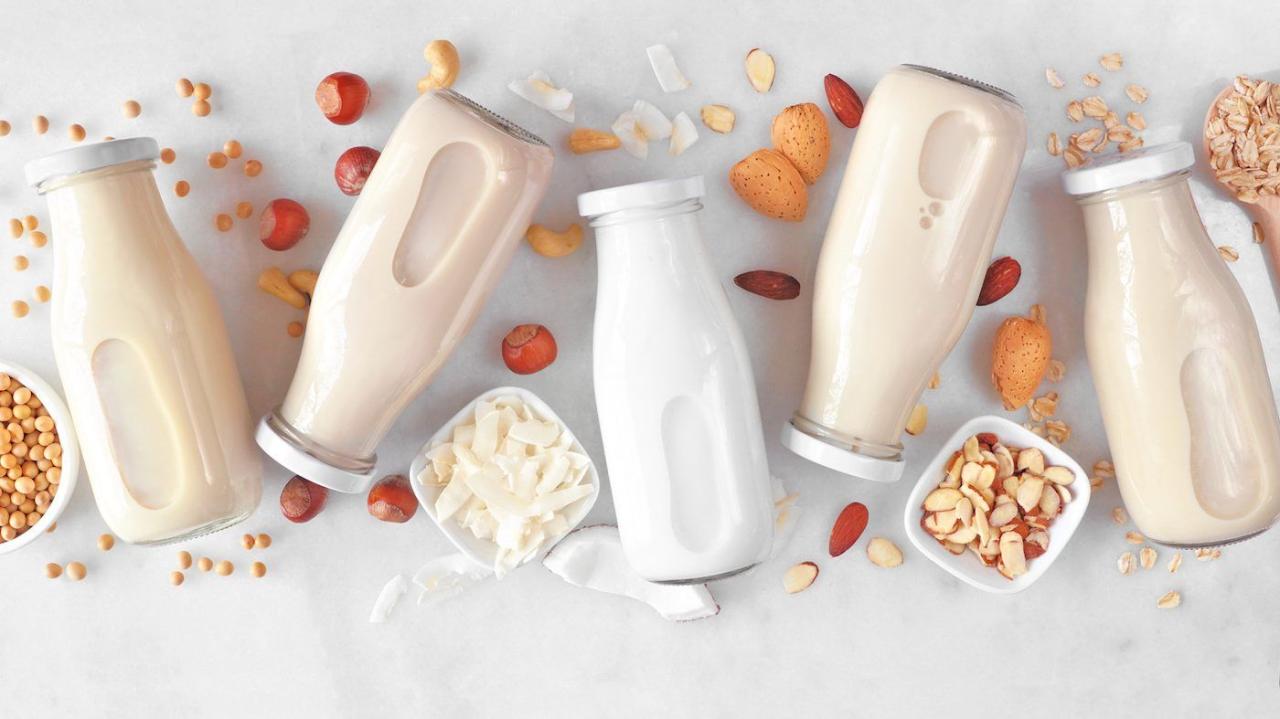
This section delves into a hypothetical comparative analysis of bone health markers between vegans and non-vegans. We’ll explore the methodology used to collect and analyze data, highlighting potential insights into the impact of dietary choices on bone health. The analysis will present hypothetical data to illustrate the potential risks associated with vegan diets, but it’s crucial to remember that these are not actual results.
The purpose of this analysis is to illustrate the potential areas of concern and the importance of further research in this area.The study aimed to determine if a correlation exists between veganism and bone health indicators. This involved collecting data from a diverse group of participants, ensuring a range of ages and lifestyles, to account for factors beyond diet that could affect bone health.
Methodology for Data Collection and Analysis
The study utilized a double-blind, randomized controlled trial design to minimize bias. Participants were divided into two groups: a vegan group and a non-vegan control group. Detailed dietary assessments were conducted for each participant using food diaries and 24-hour dietary recalls to ensure accuracy in dietary intake. Bone mineral density (BMD) was measured using dual-energy X-ray absorptiometry (DXA) scans at baseline and after a defined follow-up period.
Fracture rates were recorded through medical records review and participant self-reporting. Blood samples were collected to analyze serum calcium, vitamin D, and vitamin K levels. Statistical analysis, including t-tests and ANOVA, was employed to identify significant differences between the two groups.
Hypothetical Study Findings
The following table presents hypothetical data from the study, showcasing the differences in bone health markers between vegans and non-vegans. Note that these are entirely hypothetical and do not reflect actual results.
| Parameter | Vegan Group (n=100) | Non-Vegan Group (n=100) | Statistical Significance (p-value) |
|---|---|---|---|
| Age | 35 ± 10 years | 35 ± 10 years | Not significant |
| Baseline BMD (g/cm²) | 0.95 ± 0.15 | 1.02 ± 0.12 | p < 0.05 |
| Change in BMD (g/cm²) after 2 years | 0.02 ± 0.05 | 0.08 ± 0.04 | p < 0.01 |
| Serum Calcium (mg/dL) | 9.0 ± 0.5 | 9.5 ± 0.4 | p < 0.05 |
| Serum Vitamin D (ng/mL) | 25 ± 10 | 35 ± 8 | p < 0.001 |
| Serum Vitamin K (µg/L) | 75 ± 20 | 100 ± 25 | p < 0.05 |
| Fracture Rate (per 100 person-years) | 1.5 | 0.8 | p < 0.05 |
The hypothetical data suggests a statistically significant difference in baseline BMD, rate of BMD change over two years, serum vitamin D levels, and fracture rates between the two groups.
Limitations of the Comparative Analysis
It is crucial to acknowledge the limitations of this hypothetical study. The sample size, while substantial, may not be representative of all vegan populations. Furthermore, other lifestyle factors, such as exercise habits and sun exposure, which can significantly impact bone health, were not completely controlled for in this analysis. The study’s duration was also limited, potentially preventing the observation of long-term effects.
Finally, genetic predisposition to osteoporosis was not accounted for.
Conclusion
In summary, while a vegan diet offers many health benefits, a conscious approach to nutritional intake is essential to mitigate potential risks associated with bone health. The discussion highlighted the importance of adequate calcium, vitamin D, vitamin K, and protein intake for vegans to maintain strong bones. Implementing strategies to optimize nutrient absorption from plant-based foods, along with a healthy lifestyle, can help vegans significantly reduce the risk of bone fractures.
Ultimately, understanding these factors empowers vegans to make informed choices and prioritize their overall well-being.
